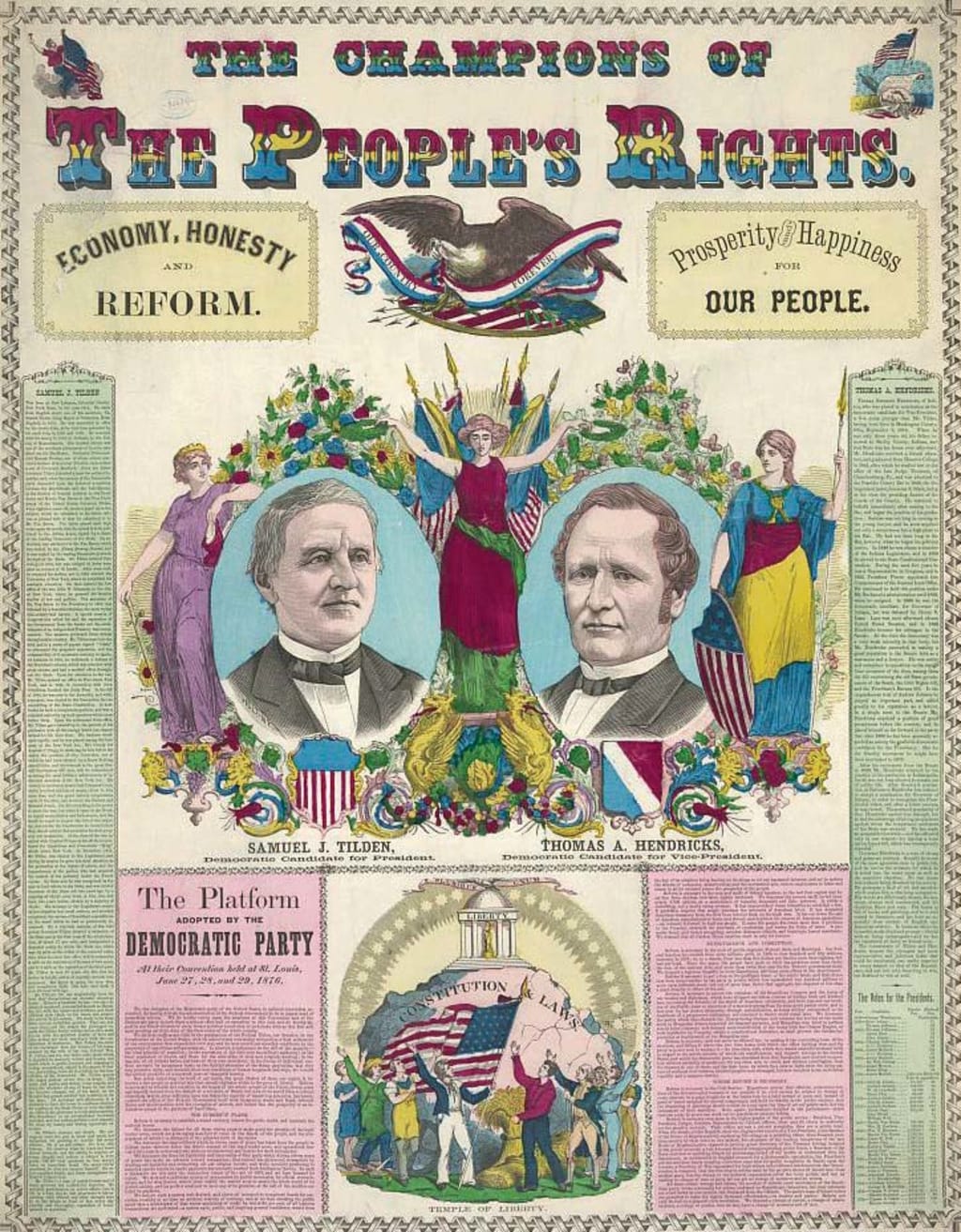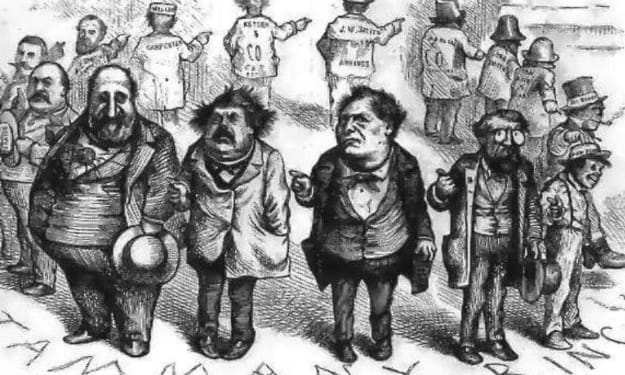Reconstruction Ends
Democratic Conventions 1872-1880

The Fourth in a series of 20 on the history of the Democratic National Convention
1872: The Shortest Convention in History
Date: July 9 - 10, 1872
Venue: Ford’s Grand Opera House, Baltimore. Located at Fayette between North Howard and North Eutaw, it operated from 1871 to 1964, It was started by John Ford, who also owned the theater where Lincoln was assassinated. There is still a theater on the block, the Everyman, but the parking garage across the street is the former site of the Opera House.
Events: The 1872 convention was the shortest national convention on record, just over six hours on two days. Rather than nominating their own candidates, Democrats decided to nominate the candidates of the Liberal Republican Party: crusading journalist Horace Greeley of the New York Tribune and G Gratz Brown as their standard bearers. Greeley received 686 of 732 votes on the first ballot. Brown, a former Senator and Governor from Missouri, was elected Greeley’s running mate on the first ballot.
There were no speeches at the convention. The platform called for the end to Reconstruction and amnesty for former confederates.
November: Grant beat Greeley by a huge margin both electorally and in the popular vote. Greeley died on November 29, before the electoral college could meet. Most of his 66 votes went to Gratz. Grant won the popular vote 56 to 44 percent. Greeley did well in five states (Georgia, Kentucky, Missouri, Tennessee and Texas) and narrowly won Maryland.
1876: The Election that Ended Reconstruction
Dates: June 27-29, 1876
Venue: Merchants Exchange, St Louis. Between Chestnut and Pine on Third Street between 1875 and 1958. It was the first commodities exchange in the US, even before the Chicago Board of Trade. The current site holds the Hyatt Regency hotel, and is about a block from the Gateway Arch. The 1876 convention was the first to be held west of the Mississippi River.
Events: Democrats nominated reform Governor Samuel Tilden of New York fairly quickly, after only two ballots. Tilden chose Indiana Governor Thomas Hendricks, who had finished second in the balloting, to be his running mate.
The 1876 platform called for civil service reform (which gained immediacy after the assassination of James Garfield by a disgruntled office seeker) and restrictions on Chinese immigration (which culminated in the 1883 Chinese Exclusion Act).
November: The election of 1876 is by far the most contested race in the history of the United States. Tilden actually received 250,000 more votes than Republican Rutherford Hayes. And after electors voted, the votes of three states (Florida, Louisiana and South Carolina) were still contested. An electoral commission decided that Hayes would get the disputed votes by a vote of 8 to 7, and Hayes won the electoral college 185 to 184. It remains the closest presidential election in US history.
The election of Hayes was seen by many as a corrupt bargain, as Hayes ended Reconstruction for all intents and purposes during his administration, ushering in the era of Jim Crow repression against African Americans that lasted for decades.
1880: A Soldier Statesman For President
Dates: June 22 - 24, 1880
Venue: Cincinnati Music Hall, 1241 Elm Street, Cincinnati, Ohio. Built in 1878, the building is still in use as a musical performance venue. It is registered as a National Historic Landmark. It is located directly across the street from Washington Park.
Events: After his stinging loss in the 1876 election, Samuel Tilden had been planning a run in 1880, but he fell flat at the convention. Military hero General Winfield Hancock Scott and Senator Thomas Bayard of Delaware were the leading contenders after the first ballot. Scott picked up a lot of support on the second ballot, and was chosen unanimously on the third. Scott was noted for his service in the Mexican War in 1847 and at the Battle of Gettysburg. The delegates chose William Hayden English, a former congressman from Indiana, for Vice President.
Susan B Anthony spoke at the convention in favor of women’s suffrage, but delegates did nothing to promote it. The major issues at the convention were economic: hard versus soft currency and tariffs. That and bashing the Republicans for stealing the 1876 election.
November: Hancock ran an incredibly close race, losing by 2000 votes out of almost 9 million cast. Hancock and James Garfield each won 19 states, by Garfield won the heavily populated states of the North and carried the day. Garfield could not enjoy his victory long. He w
as shot after only four months in office and died in September 1881. Chester A Arthur became the 21st President.






Comments
There are no comments for this story
Be the first to respond and start the conversation.